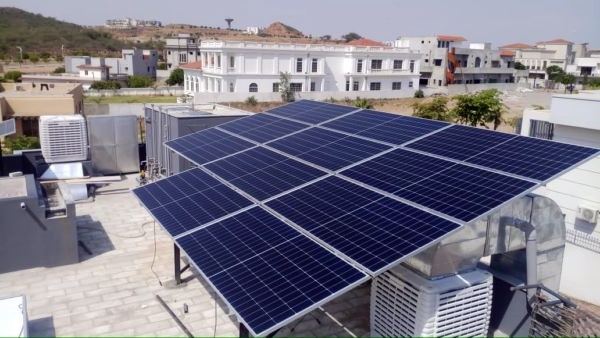
In Peshawar, the combination of intense heat, frequent load shedding, and costly electricity has led to an unprecedented surge in the demand for solar panels.
Razia, a resident of Peshawar, says that the unbearable heat in recent years, coupled with relentless load shedding and exorbitant electricity costs imposed by WAPDA, has prompted her to install solar panels. "Every second house has solar panels on its roof. Anyone who can afford it is opting for solar energy," she notes.
Rehmat Gul, a solar panel dealer, confirms that the sale of solar panels has skyrocketed due to load shedding and expensive electricity. "Many new solar panel shops have opened up," he says. "The price of a 585-watt solar panel has reached up to 22,000 rupees, with prices varying according to quality."
Also Read: Family Dispute Leads to Tragic Shooting in North Waziristan
Gul mentions that not only his business but every solar panel business has seen a boom this summer due to the continuous rise in electricity prices and load shedding. "People have started moving towards solar panels in large numbers," he adds.
According to Gul, more solar panels are being installed in the suburbs than in Peshawar city because these areas experience the highest load shedding, sometimes only receiving 2 to 3 hours of electricity in 24 hours.
Estimates suggest that 70% of Peshawar's suburbs and 50% of inner cities have switched to solar systems. Government tax reductions have significantly lowered prices. Solar dealers report substantial profits from importing solar panels. Frustrated by soaring electricity bills, many people are increasingly adopting solar energy. A solar panel that cost Rs 80 per watt a year ago is now available for Rs 35. Electricity theft is rampant in Peshawar's suburbs, further exacerbating load shedding and driving the switch to solar.
Humaira, from Charsada Umarzai village, explains that the town experiences severe electricity shortages as soon as the heat intensifies. "One reason is the high rate of electricity theft, leading to power loss in summer," she says. Another major issue is that the village receives very little electricity due to non-paying bills. "Most villagers are poor and can't afford the high bills, so WAPDA increases load shedding. Those who can afford it have shifted to solar panels," she adds.
Humaira further criticizes the government's approach, arguing that high electricity costs and frequent outages have forced even the poor to consider solar panels. "Investing 10 to 15 lakhs in this inflation era is not easy for poor people. Those with money have installed solar systems, but what will happen to the poor? The government should prioritize resolving the electricity crisis and reducing costs," she urges.
Meanwhile, government buildings such as the Governor House and Traffic Headquarters have already installed solar systems, suggesting that solar panels may soon be seen on all government buildings.